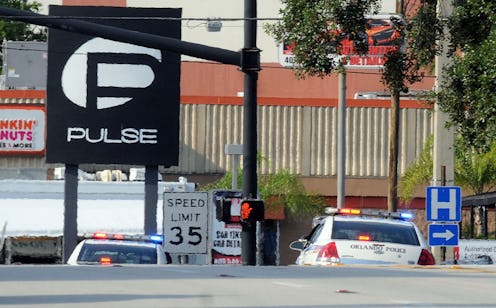News
The Terrible Irony About Donating Blood In Orlando
In the wake of the horrific attack on Pulse nightclub in Orlando, which is being called the worst mass shooting in U.S. history, there are calls for blood donations. With the latest reports saying at least 50 people are dead and 53 are injured, Orlando hospitals are in need of blood to provide care for the victims of the Sunday morning attack, which law enforcement officials are calling an act of terrorism. The non-profit OneBlood has said there is an "urgent need" for O negative, O positive, and AB plasma donors. If you are in the central Florida area, you can go to a OneBlood center or call 1-888-936-6283.
Update: On Sunday, OneBlood tweeted: "All FDA guidelines remain in effect for blood donation. There are false reports circulating that FDA rules were being lifted. Not true." Reports that policies were changed to allow donations from men who have had sex with men are false. According to Susan Forbes from OneBlood, the organization must follow all requirements in place by the FDA. The FDA formerly had a lifetime ban on donations from men who have had sex with men, but it was recently changed to a ban on donations from men who have had sex with men in the past 12 months. OneBlood is still working to implement that policy.
"We're working as quickly as possible behind the scenes to implement the new policy, and we understand how people want to be able to help, and we thank them, but we have to make sure we have every thing right," Forbes tells Bustle.
In a press conference Monday morning, Orlando police confirmed that 49 people had been killed and 53 injured early Sunday morning at Orlando's Pulse gay nightclub in the deadliest mass shooting in recent U.S. history.
Earlier: The Orlando Sentinel is reporting that OneBlood is overwhelmed with people wanting to donate, and is asking donors to make an appointment and return in the coming days.
As it stands, many gay and bisexual men may actually be prohibited from donating after the attack on a gay nightclub. The Food and Drug Administration recommends that "men who have sex with men" only be permitted to donate blood if it has been "12 months since the last sexual contact with another man."
This regulation was announced last December as a revision to the FDA's previous recommendation that "men who have sex with men (MSM) be indefinitely deferred" from donating blood. That initial lifetime ban on blood donations has been put in place in 1983 during the start of the AIDS crisis in the United States.
Some on Twitter have started sharing their frustration with the current FDA limits in light of the deadly assault on the popular gay nightclub and to remind the rest of the country that gay men can't donate unless they've been celibate for a year.
Others have taken to Twitter to call on others to help donate instead, and are hopeful that one small silver lining of this horrendous attack will be greater awareness about the blood donation limits.
Kelsey Louie, CEO for Gay Men's Health Crisis, said the FDA should go further when it made its revision on the lifetime blood donation ban, telling CNN, "It is time for the FDA to implement a policy that is truly based on science, not blanket bans on certain groups of people."
Many other LGBT groups were disappointed that the FDA's revision still involved the stipulation that men who have sex with men must avoid sex for a year before being able to donate. Daniel Bruner, a senior policy director at Whitman-Walker Health, which specializes in LGBT and HIV/AIDS care in Washington D.C., told The Washington Post the waiting period should not be longer than 30 days after sex because current technology allows the virus to be detected in the blood by that time. "The FDA must do better than this slow chipping away at antiquated bans," Bruner told The Washington Post.
Correction: An earlier version of this article claimed that OneBlood would be accepting donations from gay men. That report was false and incorrect. All FDA guidelines remain in effect.
